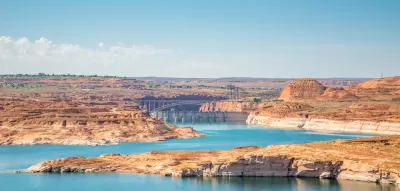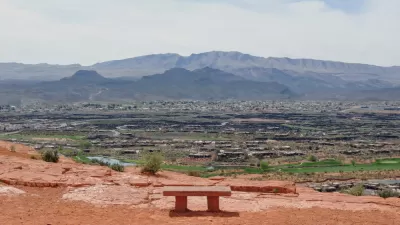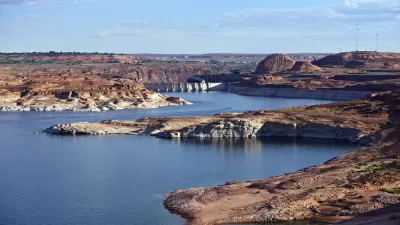Paiute Indians in Arizona oppose a plan to pipe Colorado River water from Lake Powell in Arizona to St. George in Utah, according to documents released by the U.S. Bureau of Reclamation.

"Any potential alignment of the Lake Powell pipeline would pass through lands that hold spiritual and cultural significance to Southern Paiutes, who fear the project would jeopardize their culture and upset the balance of nature," reports Brian Maffley.
The U.S. Bureau of Reclamation recently released the environmental impact statement for the proposed pipeline, revealing the concerns of the Kaibab Band of Paiute Indians about the project's intentions to divert Colorado River water to feed growing demand in the urban areas around St. George.
"Utah has a legal right to some of the Colorado’s flow and intends to put 6% of its share to use by piping it across northern Arizona and southern Utah for use in Washington County, whose population is expected to more than double by 2060 to nearly half a million," according to Maffley.
The environmental documents for the project present two alternatives: "One alternative route passes through Arizona’s Kaibab Indian Reservation and the other, preferred by the water project’s Utah proponents, skirts the reservation around its southern borders by following an existing utility corridor," writes Maffley.
FULL STORY: Lake Powell pipeline will ‘make the river angry,' Southern Paiutes warn as feds release analysis

Maui's Vacation Rental Debate Turns Ugly
Verbal attacks, misinformation campaigns and fistfights plague a high-stakes debate to convert thousands of vacation rentals into long-term housing.

Planetizen Federal Action Tracker
A weekly monitor of how Trump’s orders and actions are impacting planners and planning in America.

In Urban Planning, AI Prompting Could be the New Design Thinking
Creativity has long been key to great urban design. What if we see AI as our new creative partner?

King County Supportive Housing Program Offers Hope for Unhoused Residents
The county is taking a ‘Housing First’ approach that prioritizes getting people into housing, then offering wraparound supportive services.

Researchers Use AI to Get Clearer Picture of US Housing
Analysts are using artificial intelligence to supercharge their research by allowing them to comb through data faster. Though these AI tools can be error prone, they save time and housing researchers are optimistic about the future.

Making Shared Micromobility More Inclusive
Cities and shared mobility system operators can do more to include people with disabilities in planning and operations, per a new report.
Urban Design for Planners 1: Software Tools
This six-course series explores essential urban design concepts using open source software and equips planners with the tools they need to participate fully in the urban design process.
Planning for Universal Design
Learn the tools for implementing Universal Design in planning regulations.
planning NEXT
Appalachian Highlands Housing Partners
Mpact (founded as Rail~Volution)
City of Camden Redevelopment Agency
City of Astoria
City of Portland
City of Laramie




























